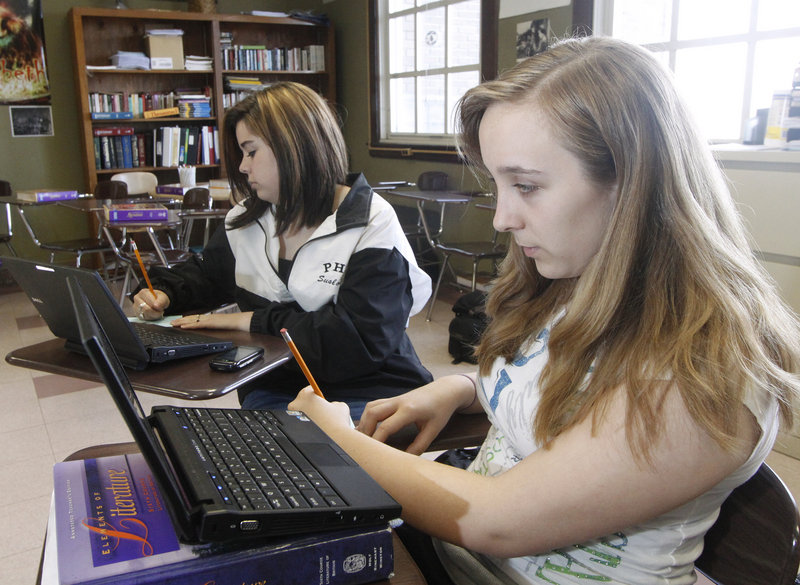PORTLAND — Portland High School is taking extraordinary steps this spring to increase the number and success of juniors who will take the SAT on May 1.
Maine high schools use the college admissions test to assess student performance, as required by federal law. But some high schools struggle to meet participation requirements because the test is given on a Saturday.
Portland High is trying to boost its participation rate from about 83 percent to 95 percent or better, said Principal Mike Johnson.
Teachers are promoting the test in every class and with every 11th-grader, using strategies such as an adopt-a-junior program, an SAT Question of the Day contest and an offer to give rides to the test.
“It’s an all-hands-on-deck approach,” Johnson said. “Every single educator is responsible for contributing to the success of our students on the SAT. We want it to be clear that we value this test and believe that it’s an important part of our academic culture.”
The goal is to preserve federal Title 1 funding for underprivileged students, which may be jeopardized if Portland High’s participation rate doesn’t rise, Johnson said. The high school also wants to get a more accurate assessment of how its programs are working for students who may be struggling.
The stepped-up effort is expected to benefit all 215 juniors who are scheduled to take the test, which will be given at the high school. Still, Johnson and his staff are really reaching out to about 36 students who, based on past participation rates, would just as soon skip the exam.
To test student progress in grades 3 to 8, Maine uses the New England Common Assessment Program, which is given on school days. The SAT, in contrast, is given on Saturdays.
That means students who aren’t motivated to take the test or have conflicting commitments often don’t show up, Johnson said.
Some don’t see the point because they aren’t planning to go to college. Some have weekend jobs to help support their families. Others, particularly students who are learning to speak English, are afraid to take a test they know little about.
“The biggest barrier for some students is the fear that they won’t do well,” said Steve Rogers, the school’s assistant principal. “Some of the students who are expected to take the test have only been in this country a year or two.”
For refugees and other immigrants with little formal education, simply putting their name on a standardized form can be a challenge that eats up most of a test period, Rogers said.
Now, in addition to SAT preparation classes for college-bound students, Portland High offers classes that show multilingual students how to take the test.
Johnson and his staff started developing a plan last fall to increase SAT participation and performance. One of the first strategies they came up with was the adopt-a-junior program.
Johnson distributed a list of juniors to all teachers and asked them to “adopt” at least one they knew pretty well and foster a mentoring relationship to prepare them for the SAT.
“In less than a day and a half, every one of those kids was adopted,” Johnson said. “Some students have two or three teachers keeping track of them.”
Other strategies include talking up the importance of the test in every class, appealing to parents of students who are learning to speak English, giving rides to students who might skip the test otherwise and giving away prizes at a barbecue lunch after the test.
Students on the receiving end of the effort say it’s working.
“It’s better to do something to encourage students to take the test than to do nothing and expect them to do well,” said Judith Abdalla, a junior from Sudan who is looking forward to taking the test.
“It’s definitely going to help kids who didn’t think the SAT is a big deal and even those who were already planning to take it,” said Alex Kiladjian, a junior who has been studying for the test, including working with a tutor, for weeks.
Kiladjian said it was common in the past to hear math and English teachers talk about the importance of the SAT, but now foreign language, social studies and even art teachers are talking about it.
Johnson acknowledges that encouraging less motivated and less prepared students to take the SAT could hurt the high school’s scores under the federal No Child Left Behind Act, but that’s not stopping him.
It’s an uphill battle for an urban school where more than 25 percent of the students are immigrants who are learning to speak English.
Portland High didn’t make “adequate yearly progress” again last year in reading or math, especially in subgroups representing students who are white, black, economically disadvantaged and learning to speak English.
However, the average percentage of students who met or exceeded state minimum standards in both subjects has increased nearly 9 points over the last three years, from 33.8 percent in 2006-07 to 42.7 percent in 2008-09.
“If we’re going to get an accurate picture of how we’re preparing our students for life outside Portland High, we have to test as many kids as possible, especially the ones who are less likely to want to take the SAT,” Johnson said.
Staff Writer Kelley Bouchard can be contacted at 791-6328 or at:
kbouchard@pressherald.com
Send questions/comments to the editors.



Success. Please wait for the page to reload. If the page does not reload within 5 seconds, please refresh the page.
Enter your email and password to access comments.
Hi, to comment on stories you must . This profile is in addition to your subscription and website login.
Already have a commenting profile? .
Invalid username/password.
Please check your email to confirm and complete your registration.
Only subscribers are eligible to post comments. Please subscribe or login first for digital access. Here’s why.
Use the form below to reset your password. When you've submitted your account email, we will send an email with a reset code.